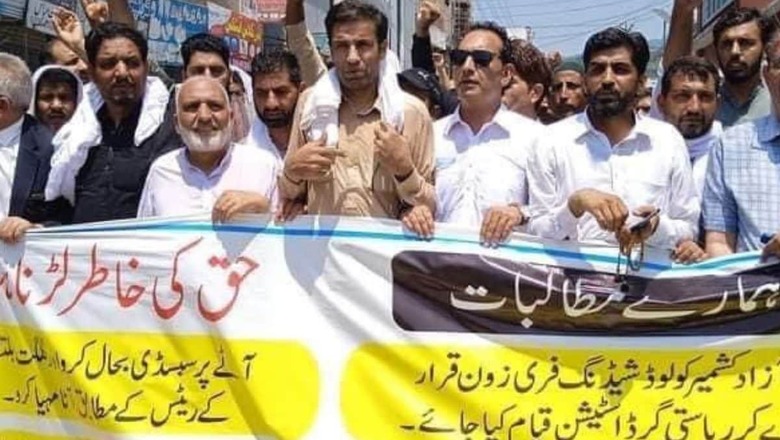
views
Sporadic passive public protests against economic injustice in Pakistan-occupied Jammu and Kashmir (PoJK) are becoming more frequent and could turn more aggressive. The state has refrained from crushing these protests using brutal force, but that might change if the protests begin to show signs of outright rebellion. So far, the protests against shortages of wheat, load shedding, cuts in subsidies and taxes on electricity bills have only displayed itself as a frustrated cathartic exercise. This is due to the build-up of the universal frustration for not being able to bring about change.
Protests against the above-mentioned economic issues began in Rawalakot in the Poonch division of PoJK. However, over a period of six months, they have spread from Bagh to Mirpur to Muzaffarabad. The Awami Action Committee is observing sit-ins in Muzaffarabad, Kotli, and Bagh to mention a few. Speeches made during the past week are showing signs of frustration turning into anger toward both the PoJK government as well as that of Pakistan.
More and more people are becoming vocal against Pakistan’s oppression of the natural resources of PoJK. At protest rallies, angry speakers are informing the wider public that Pakistan is purchasing electricity from PoJK at the rate of Rs 2.03 a unit and then selling it back to PoJK at the rate of Rs 53 per unit. They are reminding protestors of the promises made by Pakistan to the oppressed people of PoJK in the 1960s when Pakistan usurped their most fertile lands in the Mirpur district and constructed the Mangla dam that caused hundreds of centuries-old villages to drown. Pakistan then promised that PoJK would get free electricity.
Currently, sanitary workers and pensioners from all over PoJK are getting ready for a long march to the capital city of Muzaffarabad with demands of an increase in wages and pensions, a review of the pay scale and making ad-hoc employees permanent who have been on the job for up to 15 to 20 years. To add insult to injury, Pakistan has cut down development funds for PoJK from Rs 4.2 billion to a meagre Rs 92 million.
The situation in Pakistan-occupied Gilgit-Baltistan is no different. Awami Action Committee had announced the launch of a PoGB-wide protest movement on September 29 against the lack of wheat, load shedding, unemployment and the ever-rising cost of living. This is being seen as a great step from the recent attempt by the religious proxies of the state of Pakistan to divide the ongoing protest movement on a Sunni-Shia communal basis.
Another factor in play that has come to dominate the mass psychology of the population in PoJK is the realisation that the economy of their occupier has reached a point where the government has no money to fix a debt-ridden economy and the only method Pakistan is applying to get out of its economic quagmire is by further imposing taxes and cutting subsidies on the people of Pakistan and PoJK-GB.
The Senate Standing Committee on Overseas Pakistanis reported on September 27 that 90 per cent of beggars arrested in foreign countries belong to Pakistan. 50,000 engineers in Pakistan are reported unemployed. Hundreds of thousands of citizens are fleeing Pakistan daily. There are 0.2 million Pakistanis in Qatar, 1.5 million in UAE and 3 million in Saudi Arabia. Among them are a large number of ‘Pakistanis’ of PoJK origin.
The recent unannounced tour of PoGB made by the US Ambassador to Pakistan, Donald Blome, is being seen as a fact-finding trip to feel the pulse of the masses in that part of the world. During his six days in PoGB, Ambassador Blome visited places and met local people of influence. Answering a question about his trip to PoGB, the US Ambassador in Delhi, Eric Garcetti, said that the US considered the Kashmir issue a bilateral issue between India and Pakistan and that America will not play a third-party role in its resolution.
Under the current scenario, public protest in both PoJK and PoGB is gathering pace at an alarming rate. Whether this will progress in the direction of an outright rebellion against Pakistani occupation depends on the willingness of our mother country, Bharat, to translate the will of the people of PoJK-GB to reunite the broken state of Jammu and Kashmir and make it a truly integral part of herself.
In the past, leaders of India have lost many opportunities to end the occupation of PoJK-GB. The hesitation by the late Jawaharlal Nehru to send troops towards the Mirpur division in November 1947, and the wars in 1965, 1971 and 1999 have all contributed to the prolonged subjugation of the people of PoJK-GB. Now, let’s not turn PoJK-GB’s current uprising into another lost opportunity for Bharat.
Dr Amjad Ayub Mirza is an author and a human rights activist from Mirpur in PoJK. He currently lives in exile in the UK. Views expressed in the above piece are personal and solely that of the author. They do not necessarily reflect News18’s views.



















Comments
0 comment